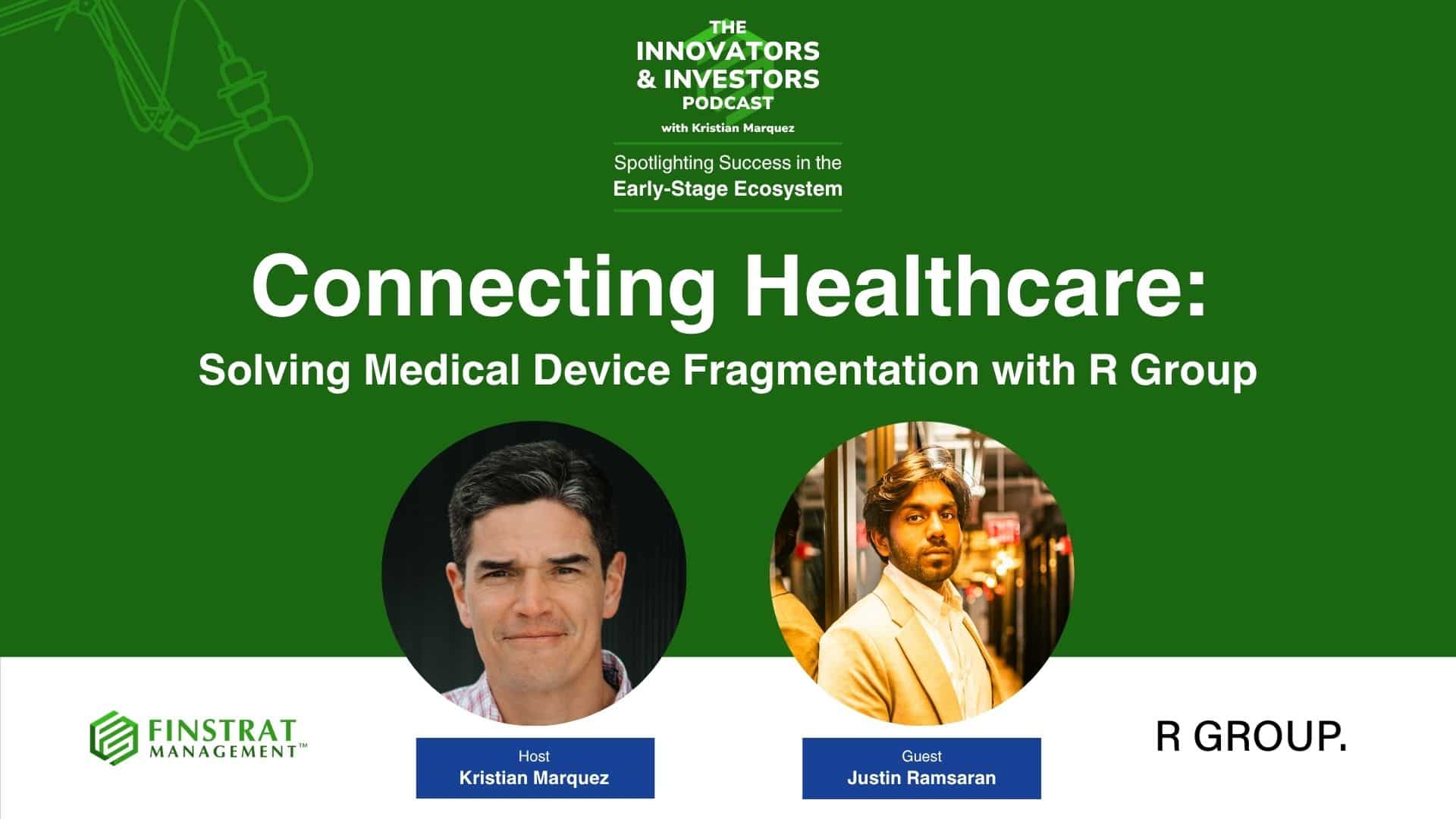Connecting Healthcare: Solving Medical Device Fragmentation with R Group
June 24, 2025 | 28 MIN

Highlights
- The R Group tackles medical device connectivity fragmentation in healthcare.
- Health Mosaic is a comprehensive platform enabling seamless data integration and access.
- Healthcare data interoperability remains limited despite HL7 and TEFCA standards.
- The R Group focuses on powering AI with clean, structured data rather than building AI directly.
- Justin’s entrepreneurial path highlights starting with professional services to bootstrap growth.
- Customer success, with emphasis on adoption and responsiveness, is critical for scaling.
- Unconventional thinking and perseverance are essential for innovation in med tech startups.
Summary
In this insightful conversation on The Innovators and Investors Podcast, host Kristian Marquez interviews Justin Ramsaran, co-founder and CEO of the R Group and VP of Digital Health Solutions at Fukuda Denshi, to discuss critical challenges and innovations within the healthcare technology space, specifically focusing on medical device connectivity and interoperability. Ramsaran’s company, R Group, was born out of frustration with fragmented and siloed health data caused by proprietary, point-to-point solutions used by device manufacturers. Their flagship product, Health Mosaic, provides a comprehensive, turnkey connectivity solution that empowers healthcare providers to access and utilize their collected medical data for improved clinical decision-making.
Justin highlights the broader industry’s ongoing struggle with interoperability, despite efforts like HL7 standards and recent mandates such as TEFCA and QHIN, which encourage data exchange among EMR systems and medical devices. He emphasizes that a core challenge in healthcare technology remains the lack of open, standardized integration—data remains siloed among competing platforms like Epic and Cerner.
The R Group’s unique approach is not to develop AI solutions themselves but to focus on providing clean, well-structured, and accessible data infrastructures that power AI applications, enabling true augmentation of clinical workflows. The conversation also explores Justin’s entrepreneurial journey, emphasizing the importance of starting with professional services to gain market understanding and fund product development, focusing on niche problems, and iterating with customer-centric strategies, especially in the conservative and complex healthcare market.
Justin stresses that building a customer success team dedicated to adoption and enablement—not just support—is pivotal for retention and scaling. He further describes how AI will augment clinical decision-making by synthesizing complex, real-time patient data streams to provide predictive insights without replacing human oversight. Finally, Justin reflects on the value of unconventional thinking and persistence as keys to entrepreneurial success and shares his openness to engage with others seeking to innovate in healthcare technology.
Key Insights
- Healthcare’s Device Connectivity Challenge: The healthcare ecosystem is plagued by fragmented device connectivity due to proprietary, point-to-point solutions from different manufacturers. This leads to siloed data streams that hinder smooth information flow, impeding clinical decision-making and operational efficiency. Solving this requires a unified platform able to interface with diverse devices seamlessly—a niche the R Group aims to fill. This fragmentation is not just technical but systemic, influenced by competitive market dynamics and legacy product designs.
- Interoperability Efforts Have Limitations: Although standards like HL7 have somewhat standardized data formats, true interoperability is still hindered by vendors maintaining proprietary ecosystems. TEFCA and QHIN represent more recent regulatory pushes encouraging data sharing across platforms, signaling a slow but necessary shift in the industry’s approach. However, healthcare’s conservative nature, entrenched vendor lock-ins, and complex stakeholder interests cause slow adoption and continued fragmentation.
- AI as Augmentation, Not Replacement: Instead of competing in the AI space, the R Group’s strategy focuses on delivering reliable, well-structured data streams to power AI applications effectively. Justin underscores that quality input data is fundamental—garbage in, garbage out—and that real value in healthcare AI lies in augmenting clinician decision-making with predictive insights generated from integrated multi-parameter data, improving early detection of critical conditions without removing the human clinician from the loop.
- Professional Services as Foundation for Product Success: The R Group’s pivot from software development services to product development illustrates a pragmatic pathway many startups follow. Beginning with services allowed them to deeply understand client needs, develop credibility, generate early revenue, and narrow down product-market fit. This approach also provides operational stability and user feedback that fuels product innovations, reflecting a smart method for healthcare startups operating in complex, slow-adoption markets.
- Customer Success Over Support: Emphasizing enablement, adoption, and proactive engagement rather than reactive customer support allowed the company to build stronger client relationships. By incentivizing the customer success team for retention and expansion—not just ticket resolution—R Group created “sticky” solutions embedded into client workflows, which reduces churn and accelerates growth in a sector where sales cycles are traditionally prolonged and complex.
- Navigating Healthcare’s Complexity Requires Multifaceted Engagement: Successful technology adoption in healthcare requires understanding the ecosystem broadly, involving stakeholders from biomedical engineers to CIOs, CFOs, and frontline clinicians. Solutions must improve operational efficiency and return on investment without risking patient safety or requiring extensive retraining. This multi-level engagement approach strengthens organizational buy-in, essential for navigating healthcare’s inherently conservative and risk-averse culture.
- Unconventional Thinking and Persistence Drive Innovation: Justin’s reflection on entrepreneurship highlights the importance of challenging norms and being willing to take detours. His journey through multiple startups in cybersecurity and med tech underscores that success rarely follows a straight path. The willingness to innovate on the edges, persevere despite setbacks, and continuously pivot based on market realities is crucial, especially in legacy-laden industries like healthcare.
Conclusion
Justin Ramsaran’s insights provide a rich understanding of the challenges and solutions shaping medical device connectivity and digital health innovation today. His pragmatic, customer-focused approach combined with visionary thinking on the role of data in powering AI solutions encapsulates key best practices for healthcare tech entrepreneurs. His emphasis on interoperability, comprehensive stakeholder engagement, and iterative development resonates strongly with the realities of healthcare’s complex technology landscape, offering valuable lessons for startups aiming to make an impact in this critical sector.
Stay up-to-date with Justin Ramsaran and his work at R Group.
Follow the show on your podcast channel of choice or listen below:




